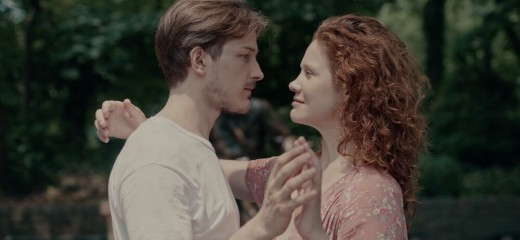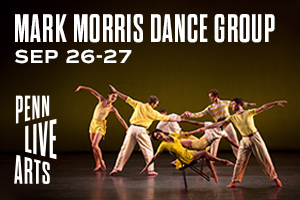
Aviva Makes the Right Moves, But Not Without Missteps
by Kristi Yeung
The cast of the film Aviva is comprised entirely of dancers instead of actors, and the two protagonists are each played by two different people: one man and one woman. I learned these things from the trailer where one of the dancer-actors explains these facts. I thought the clip was purely for marketing purposes, a smart strategy to disclose the behind-the-scenes decisions that make the work special. However, it turns out that the scene is actually from the movie’s opening monologue, where it feels heavy handed. The opening salvo highlights the film’s best features—the dancing and exploration of gender—and it is an example of the film’s weakest element—a claustrophobically self-conscious breaking of the fourth wall.
Written and directed by Boaz Yakin, Aviva starts out as a love story between Aviva, a woman from Paris (Zina Zinchenko), and Eden, a man from New York (Tyler Phillips). Initially, there’s not much remarkable about these two, but as they get to know one another, they each reveal a different side to their characters. Aviva’s alter ego is a man (Or Schraiber), while Eden’s is a woman (Bobbi Jene Smith). As the film progresses, the characters’ two halves begin appearing simultaneously onscreen. The couple becomes a quartet, and the film pivots its focus from the characters’ relationship with one another to each characters’ relationship with their shadow self.
The dynamics within the ensemble are best expressed in Smith’s dance scenes. One particularly memorable performance occurs after Aviva splits from Eden. In the desert, Aviva (man) searchingly undulates his arms and torso with alien-like fluidity. Aviva (woman) is largely absent from this scene, suggesting that the breakup with Eden also causes a rift between the two Avivas.
Another striking dance sequence occurs after Eden (man) argues with Eden (woman) about flying to Los Angeles to pursue a romantic interest. Eden (woman) frantically pantomimes the trip in a large, empty room. Running from wall to wall, Eden (woman) throws her body through the motions of going through airport security and mimics the sounds of an airplane. Her distress reveals that she is not ready to move on from Aviva even though her masculine counterpart is.
The opening monologue suggests that the majority of the narrative will be told through dancing. In reality, the plot progresses primarily through talking, and the script struck me as overwrought and clichéd. It doesn’t help that the film repeatedly breaks the fourth wall, calling attention to its flaws. Microphones and other equipment occasionally appear in frame, while characters recount their feelings directly to the camera. These meta-references confine the story to the screen and make the romance feel shallow.
The acting is often lackluster, but had the film’s opening not warned me that it was being performed by dancers, I may not have been so attuned to this. In so many missed opportunities, the dancers—graduates of prestigious programs and members of renowned companies—are made to talk about their characters’ feelings instead of expressing them through movement. In one particularly frustrating scene, Eden (man) talks about the possibility of breaking into dance in a vast, loft-like space—a dancer’s dream studio. He then proceeds to stand rigidly in the center of the room, verbally recounting a past experience.
The premise of Aviva is compelling, but the film falters in execution. It makes bold artistic decisions regarding dance and gender but undermines their impact with its insistence on being self-referential. Despite its flaws, Aviva raises important questions about film conventions: it reminds me that I’m tired of seeing mediocre dancing in movies and bored with the heteronormativity of onscreen romances. While Aviva doesn’t provide the perfect solution to these issues, it represents a step forward, and for that reason, it is deserving of some attention, even if it doesn’t get the full two hours of your time.
Aviva, Outsider Pictures, Annenberg Center for the Performing Arts (online film event), November 13-15.
By Kristi Yeung
November 29, 2020









